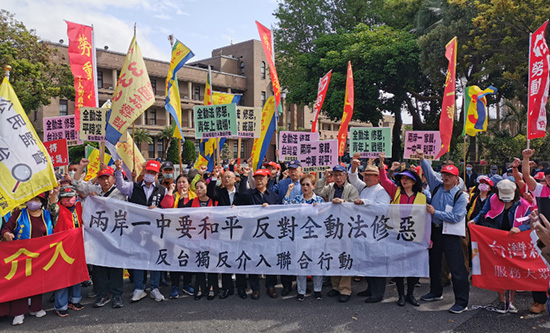
On 26 March Honduras switched diplomatic ties from Taiwan to the People’s Republic China (PRC). This leaves just 13 nations in the world formally recognising Taiwan. Taiwanese leader Tsai Ing-Wen visited Guatemala and Belize, two remaining Central American allies, in March and April, making two hugely provocative unofficial stops in the United States. This is an expression of the increasing polarisation of the world into competing blocs, catalysed by US imperialism’s mobilisation towards conflict over Taiwan with China, which it views as the greatest threat to its hegemony.
The extent to which US imperialism is supported in its aims does however go beyond the diplomatic dealings of 13 small nations. Taiwan still has over 100 de facto embassies/consulates globally and maintains unofficial relations with 59 United Nations members. These include the US and its imperialist allies such as Britain, Australia, Canada, and Japan.
The western imperialists cannot openly declare relations with Taiwan because this would be a violation of the ‘One China’ policy to which they are signatories. Adhered to globally since its inception in its current form in 1992, it dictates that Mainland China and Taiwan form ‘One China’, but there are differing interpretations. The PRC views Taiwan as a province of China, as it has been historically for more than three centuries, and it therefore views Taiwanese politics as its own internal politics. Taiwan, on the other hand, sees itself as the sole heir to the entirety of China: The Republic of China, as established in 1911. The basis for this is the retreat of the former Chinese ruling party, the thoroughly reactionary Kuomintang (KMT), to Taiwan in 1949 after its defeat in the Chinese socialist revolution.
In order to draw China into some form of direct conflict, US imperialism is attempting to undermine the ‘One China’ policy by fostering secessionist tendencies in the Taiwanese ruling class. China has repeatedly stated it would intervene militarily if it sees Chinese sovereignty as being violated, and clearly regards any prospect of Taiwanese independence as such. US President Biden has met this by stating on four separate occasions that the US would intervene on behalf of Taiwan in such a scenario.
The political representation for Taiwan’s independence is Tsai Ing-Wen’s ruling Democratic Progressive Party (DPP) which was elected in 2016 with the first non-KMT majority in the legislative house since 1949. However, sections of the Taiwanese ruling class remain concerned about prospects of independence. They are alarmed at the threat of a Chinese response, which could involve an economic blockade or direct military intervention. These sections are given parliamentary expression by the KMT, the largest opposition party. On 13 May potential KMT candidate for the 2024 elections, Terry Gou, laid the blame for the PRC’s ‘hostile intent’ towards Taiwan at the foot of the DPP, specifically for substituting for One China what he referred to as ‘Two Chinas’: ‘One China, One Taiwan’, ie independence. The polarising effect of independence is clear: nine countries have switched diplomatic ties to the PRC since the DPP’s election in 2016, compared with just one in the previous eight years of KMT rule. Including Honduras, six of these nine are Central American/Caribbean states.
The threat of a Chinese blockade resonates with the Taiwanese population. Taiwan depends on exports, which account for 70% of GDP, and China is the largest market receiving some 40% of Taiwanese exports. More than half of Taiwan’s exports are accounted for by its technological sector, especially semiconductors. China has already introduced economic sanctions on Taiwan, blocking imports of 2,000 Taiwanese food products after former US House speaker Nancy Pelosi visited Taiwan in August 2022.
Following Pelosi’s visit, China also launched 11 long range missiles into water on several sides of Taiwan, including the Eastern side, demonstrating its ability to strike from the mainland. The US responded days later by sailing a guided missile destroyer through the Taiwan strait. In any event, China will be keen not to disrupt its access to Taiwanese high end semiconductor production: 92% of semiconductors smaller than 10 nanometres are produced by Taiwan. Such chips are vital to Chinese and US aims for technological superiority.
China practised a military blockade of the island in April 2023 following Tsai Ing-Wen’s US visit in which she met Pelosi’s successor, Kevin McCarthy. The ensuing three days of military drills involved 12 Chinese warships and 91 aircraft, including nuclear-capable H-6 bombers armed with live missiles. Also included were aircraft launched from one of China’s two aircraft carriers, the first domestically produced, the Shandong.
A precondition for the Taiwanese ruling class backing independence is complete confidence in support from US imperialism. Indeed, Taiwan’s development since 1949 has been entirely dependent on US aid. Following the revolution, the US was keen to maintain Taiwan as a bulwark against Chinese socialism. From 1951 to 1965, it provided $2.5bn of military aid and $1.5bn economic aid to Taiwan. This was supplemented by US officials stationed on the island, dictating the development of Taiwan’s economy and the expansion of its military capabilities. US aid was instrumental in providing both the capital and expertise for Taiwan’s development into an industrialised, export economy throughout the 1960s-70s.
Thus, the Taiwanese ruling class has historically been politically dependent on and therefore loyal to US imperialism, a process embodied until recently by the KMT. Due to constant military aid, Taiwan possesses a relatively sizeable military, with 169,000 active military personnel, backed by 1.66 million reservists. In December 2022, the DPP announced the extension of mandatory military service from four months to one year.
This occurred at the same time as a US announcement to include $10bn in its military budget to bolster Taiwan’s military over the next five years. Up until then, the Biden administration had authorised $2.9bn in arms sales to Taiwan. The Trump administration provided more than $18bn. These are some of the lengths US imperialism is prepared to go to in building for conflict with China.
George O’Connell
FIGHT RACISM! FIGHT IMPERIALISM! 294 June/July 2023




